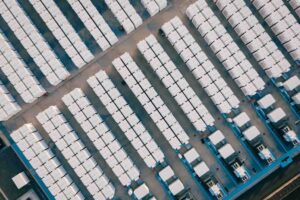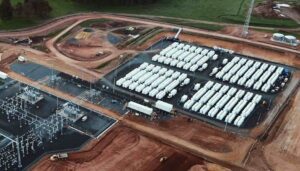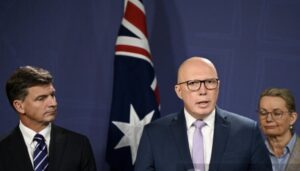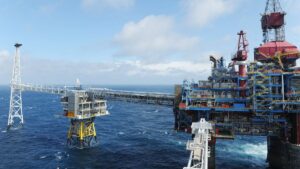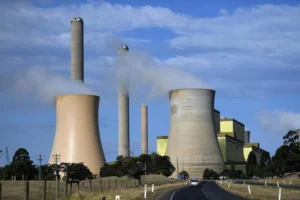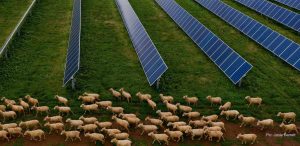The NSW Coalition government has dramatically increased its emissions reduction targets for 2030, setting a new goal of a 50 cut from 2005 levels as part of plans to be a “renewable energy superpower” and attract more than $37 billion in clean energy investment by the end of the decade.
The new 50 per cent reduction target is a significant improvement on the previous target of a 35 per cent cut. And the fact that it comes from the state with the biggest economy and the biggest coal fleet in the country, and has the support of the Nationals, put intense pressure on their federal colleagues to do the same.
NSW premier Gladys Berejiklian said the new target is about economic growth, creating jobs, reducing costs, and helping the environment.
“Our Net Zero Plan is expected to attract more than $37 billion in private sector investment into NSW, support more than 9,000 jobs, save households about $130 on their electricity bills and help NSW become Australia’s first trillion-dollar state by 2030,” Berejiklian said in a statement.
“This is about putting the policies in place to give industry and investors certainty, not only to protect our planet but to future-proof our prosperity and way of life.”
The contrast with the federal Coalition could not be more stark. It is torn between climate denialists who want to protect the coal industry, and inner city Liberals urging some small gestures to help preserve their seats in parliament.
Australia currently has a patently inadequate target of a 26-28 per cent reduction in emissions by 2030, and so far refuses to commit to net zero emissions by 2050, even though each state and territory has done so.
The only talk of a tighter interim target has been suggestions of a 35 per cent reduction target by 2035, which would simply defer action and would be insufficient to match prime minister Scott Morrison’s pledge at the recent Quad meeting in Washington to seek to cap average global warming to 1.5°C.
NSW environment and energy minister Matt Kean said the state was now on track to be one of the first to cut its emissions in half and was on track to do so while considerably growing the state economy.
“We can be a renewable energy super power and as global demand for low carbon products and investments grows, the fortunes of the state are increasingly tied to the fortunes of our planet,” Kean said.
“In NSW, we also aren’t just setting targets. As a result of our policies, the state’s emissions are projected to fall by 47-52 per cent on 2005 levels by 2030 under independently peer reviewed modelling.”
Kean has been outspoken about the need for governments to cut emissions and the economic opportunities that will be created as part of a transition to cleaner energy sources.
Kean has said that New South Wales could phase out the use of coal for electricity generation as early as 2030 and has directly challenged his federal counterpart over lacklustre national policies.
According to the update published on Wednesday, not only will the NSW government achieve its original 2030 target, but having done so, it will set itself a more ambitious goal of the 50 per cent cut – putting it on par with South Australian targets.
It will see New South Wales set a stronger target than Victoria – which has set a goal of getting 45–50 per cent below 2005 levels by the end of 2030 – and Queensland which has a 30 per cent reduction target for 2030.
Conflict is currently raging within the federal coalition, with Nationals MPs and right-wing Liberal MPs opposing any suggestions that the Morrison government could endorse a net zero emissions target.
Nationals leader Barnaby Joyce has said his party would oppose any such target unless he had assurances that it wouldn’t be a detriment to regional economies (as opposed to worsening climate change which will definitely have a negative impact on the agricultural sector).
But NSW state Nationals leader John Barilaro said the NSW government’s more ambitious climate targets would deliver benefits to regional communities, creating opportunities for new jobs and industries.
“Whether it is in modern manufacturing, minerals or agriculture, regional NSW is home to the skills, infrastructure and resources needed as the demand for low emissions technologies like batteries and hydrogen grows,” Barilaro said.
“The entire State will benefit from the economic and employment opportunities in low carbon technologies, and we will continue to take action in a way that delivers more jobs and more investment for people in the city and in the bush.”
The ‘Net Zero Plan: Stage 1 Implementation Update’ published by the NSW government on Wednesday details the measures the it is implementing to drive investment in clean energy, electric vehicles and cutting industrial emissions.
The NSW government is aiming to attract as much as $32 billion of investment in new wind, solar and energy storage projects over the next decade, including through the creation of dedicated Renewable Energy Zones.
The state government will spend $490 million supporting new electric vehicle infrastructure, including a new state-wide rapid charging network and has also committed $750 million to a Net Zero Industry and Innovation Program to cut industrial emissions through investments in electrification, fuel switching and the production and use of renewable hydrogen
The NSW government said that it will also begin assessing and disclosing its climate change related financial risks for the first time, aligned with the Taskforce for Climate Related Financial Disclosures framework that is becoming common practice within corporate circles.

